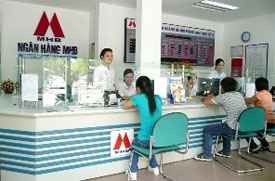IPOs failing to turn investors on
 For many years, key IPOs have overheated the equities market, especially for foreign investors.
For many years, key IPOs have overheated the equities market, especially for foreign investors.
The cases of Vietcombank (VCB), Vietinbank (CTG) and Phu My Fertiliser (DPM) are examples of giant demand against tiny supply.
After many delays, overseas investors have pushed the local government the speed up the privatisation of other giant state-owned corporations such as Mobifone, Vinafone and Vietnam Airlines. Recently, the announcement Mobifone’s possible equitisation in 2011 became a colourful topic amid the financial market’s dark outlook.
However, the facts tell another story. During June and July 2011, some big equitisations ended quietly. No single foreign investor or very few participated in the IPOs of Cosevco, Mekong Housing Bank (MHB), Housing Development Bank (HDB) and VNSteel though they could potentially rank in the top 20 of firms by asset value if listed. Petrolimex was not included as there is no legal approval for foreign participation. The total number of shares purchased by foreign investors from those four giant auctions was amazingly small, 500,000 shares equivalent to approximately $170,000. What are the key reasons for such poor performances and is action needed?
IPO stocks’ big figures
Timing for these big IPOs was not favourable when all the indices were effectively at the bottom. Although the starting price was set ‘reasonably’ close by the par value (VND10,000 per share), it is still higher than many in the listed exchange. For example, Saigon-Hanoi Bank (SHB) and Nam Viet Bank (NVB) have been trading around VND7,000-8,000 per share, while the asset quality and valuation matrix cannot explain the 20-30 per cent discount versus MHB or HDB. The liquidity premiums of the listed firms versus the new IPOs was also not taken into account.
Noticeably, the recent IPOs only offered very small percentages of ownership (less than 5 per cent of the charter capital) for sale, which implies that potential foreign investors will not have any control or board of management seats. Without a strategic component, these IPOs only provide financial investment opportunities, which is not the ultimate goal of many conglomerates which prefer 10-30 per cent ownership at a minimum. From the return perspective, there is no persuasive reason for participation in the biddings.
Shortage of funds from foreign institutions
Before 2010, even in the financial crisis, foreign funds were abundant in Vietnam with many nominees. As mostly long-term, fundamental investors, they aggressively bought in when the market hit bottoms.
The story is now different. For foreign funds that have been operating in Vietnam for a while, the net asset values (NAVs) have been continuously depreciating, while cash flows are drying up. Investments in previous IPOs such as VCB, DPM, and Sabeco have resulted in big losses. That means that confidence has gradually diminished and unless the opportunities are financially attractive, cash will head elsewhere. For the new foreign cash flows, macroeconomic stability and economic growth are the main criteria.
Though the long-term prospects for Vietnam are still bright in the eyes of many investors, short and medium-term views are cautious. With approximately 20 per cent inflation and the fast devaluation of the local currency year to date, it is too optimistic to expect new vigorous foreign investments in IPOs.
Take action or suffer the consequences
The government needs to look at recent big IPOs as a reference point for more important ones such as for Mobifone, Vinafone and Vietnam Airlines. Pricing and the percentage of ownership is important as is the positive macroeconomic outlook and investor confidence. Since there is little equity market demand, there is no way the IPOs of the remaining giants can save the market. While inflation remains a key medium-run threat and credit growth is controlled, the local market relies on foreign cash inflows. A healthy listed stock exchange is critical for the development of the over-the-counter (OTC) market, a part of which is IPOs.
The whole equity market’s health is at stake. If action is taken, beside investors, the government budget benefits the most since assets are sold at higher prices. Successful IPOs are a win-win scenario for all participants.
What the stars mean:
★ Poor ★ ★ Promising ★★★ Good ★★★★ Very good ★★★★★ Exceptional
Related Contents
Latest News
More News
- Cashless payments hit 28 times GDP in 2025 (February 04, 2026 | 18:09)
- SSIAM and DBJ launch Japan Vietnam Capital Fund (February 04, 2026 | 15:57)
- Banks target stronger profits, credit growth in 2026 (February 04, 2026 | 15:43)
- Vietnam on path to investment-grade rating (February 03, 2026 | 13:07)
- Consumer finance sector posts sharp profit growth (February 03, 2026 | 13:05)
- Insurance market building the next chapter of protection (February 02, 2026 | 11:16)
- NAB Innovation Centre underscores Vietnam’s appeal for tech investment (January 30, 2026 | 11:16)
- Vietnam strengthens public debt management with World Bank and IMF (January 30, 2026 | 11:00)
- Corporate bond market poised for stronger growth cycle (January 28, 2026 | 17:13)
- Vietnam's IPO market on recovery trajectory (January 28, 2026 | 17:04)

 Tag:
Tag:




















 Mobile Version
Mobile Version